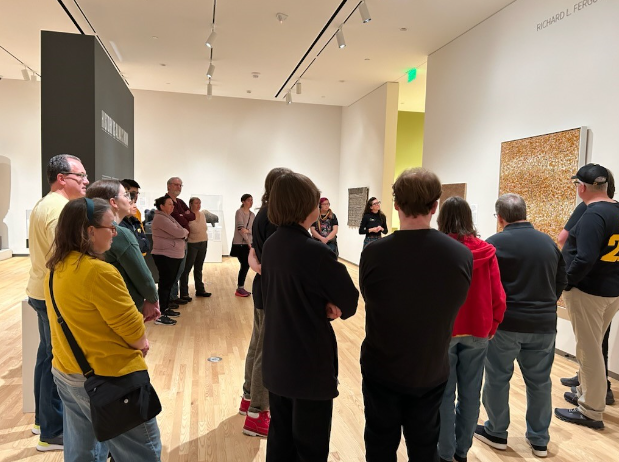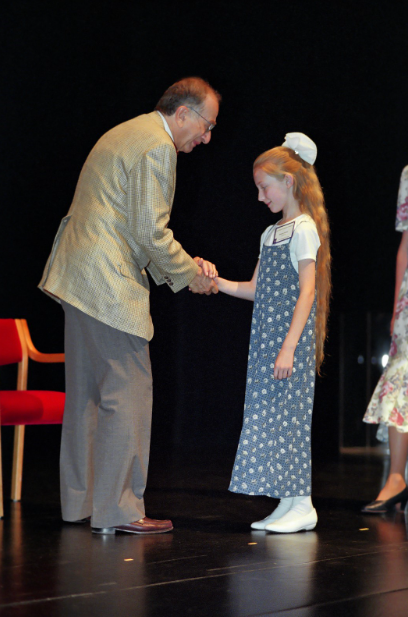The Academy for Twice-Exceptionality began its third academic year this fall, growing significantly from working with two students in 2021 to fourteen this academic year. Randy Lange, PhD, sat down with two of the current students to reflect on their first semesters. One is Logan, a first-year student, so the University of Iowa was still new to them. The second is Andy, a senior scheduled to graduate in May, so he had to go down memory lane.
Logan is currently an elementary education major, and Andy is a double major in political science and international relations. Logan reports that they possess talent in art and literary analysis. Andy feels his true strength is in his debating skills.
With all the college choices, what made you choose to attend the University of Iowa?
Iowa was recommended to Logan because of the Academy for Twice-Exceptionality. They shared, “in all honesty, it is the only placed I looked at.” Andy wanted to attend college out of state (specifically one that aligned more with his political views), but not to go too far: “I wanted a break from Illinois.” Andy felt like he really connected with the college representative who came to his high school and when he visited, he really liked the campus.
What has been one of your favorite things about the University of Iowa? Anything you wish you would have done differently?
Logan appreciates the fact that you can walk everywhere – there is no need for a car. Their residence hall is close to two different dining halls, so that provides them with options for each meal. They also note that, “Everyone has been very nice here.” Andy is an avid sports fan, so attending sporting events and cheering for the Hawkeyes has been great. He is a true Iowa football fan but feels strongly about the need for an improved offensive coach with improved schemes and recruiting that will get our offense clicking like it’s 2002 again!
Before coming to campus, how did you prepare yourself for attending the University of Iowa?
Logan visited the campus five times with their family and did three official campus tours! Logan recalls trying to figure out what to bring and pack. They brought a lot of folders. Upon reflection, they wish they would have brought more towels and cleaning supplies. Andy took a lot of AP (Advanced Placement) courses so he would be able to take lighter semester hour loads each year and still graduate in four years. He smiled as he shared that this also prevented him from having to take “putrid” classes like math. Because he was two years ahead in math in high school, he could avoid that subject in college. Andy wouldn’t change anything he did to prepare for life as a Hawkeye: “I feel like I was well prepared.”
What is something you packed for college that you never used (or have not used yet)?
While Andy could not recall much that was unused besides bedsheets, Logan could pinpoint something: “My mom packed me a lot of random things that I have not used. In fact, one dresser drawer has a lot of extra things (like bedding) that have stayed in there for the entire semester. “
What class your first semester enhanced your talent area(s) the most?
While Logan’s art education course was introductory, it forced them to branch out artistically and use creativity, specifically in the subjects they drew. Logan enrolled in Coming-of-Age Literature, a course that required analyzing comics and music. The poetry section of the class helped Logan to seek metaphors, associations, and connotations. Logan said, “Because of my autism, this was not always the easiest for me, but I grew in this area.”
For Andy, it was his rhetoric class the first semester that required speeches where his debating skills could shine. “For example, I gave a speech where I took the perspective of someone else. My first semester was during COVID, so I decided to make mine a satirical response, so I took on the perspective of the Chinese president bashing America’s COVID response that blamed his country.”
What is something you did your first semester outside of the classroom to tap your talent area or areas?
Logan worked on a variety of art. A recent art project finds them drawing images to a song. Logan says that it is not a full animation but rather a story board of fanart related to the video game Undertale.
“As I said, COVID impacted my first semester, so I was limited,” Andy said. However, Andy still participated in the College Republican online chats. This was an excellent opportunity to use his debate skills for healthy discussion with his fellow College Republicans.
How did you hear about the Academy for Twice-Exceptionality?
Logan heard about it from their therapist, and Andy knew a staff member directly. “I knew Randy Lange since junior high school and when he came to campus to work, he contacted me.”
Logan, what do you feel has been the biggest benefit of the Academy for Twice-Exceptionality for you as a student your first semester?
“The social aspect of the program. It helped me to get started talking with other people. The people in the Academy are the people to whom I am closest with on campus. They struggle with the social aspect, too. Making new friends is a struggle for us, so it is nice to have them on the same floor as me. The one-on-one meetings have also been helpful to keep me on track with my classes.”
Andy’s first semester was before the academy was started. Andy, looking back, how might the Academy for Twice-Exceptionality have assisted you in your first semester?
“If it were online like everything was my first semester, I do not think it would have helped very much.” He wishes that at least the discussions were in-person then. “I prefer the face-to-face experiences that I have with it now.”
What was the main goal you set for your first semester?
Logan set the goal to make it to every class. Other than the few days they were sick, they met their goal. Andy wanted to get all As and Bs in his classes and shoot 100 on the golf course. “I was able to get the As and Bs but am still working on the golf course.”
What was/is your favorite first semester course? Why?
“That’s a tough choice,” said Logan. They really liked their literature class because they read so many interesting things. The class discussions were also engaging. “Everyone brought their own perspectives and interpretations to the discussions. Literature is like art in that way.”
Andy said, “I enjoyed any course that began after 1PM because I hate getting up before noon.”
How do you/did you manage stress the first semester? What are your key supports at Iowa?
Logan has tried meditation. The one-on-one meetings with Jess and the Hawk Talks with the resident advisor were helpful.
Andy does not recall really thinking about stress before he came to campus or during his first semester. “This has nothing to do with stress, but there were times I stayed in my residence hall for 3-4 days straight.” Andy reached out to his family and relaxed with TV. He found that helped a lot when feeling stressed. Involvement on campus also helps Andy to manage his stress. He is involved in bowling, Young Americans for Freedom, and the golf club.
What did you do for fun your first semester?
Logan mostly draws and plays video games. Andy read a lot of fan fiction and watched TV.
What is/was your favorite dining hall meal?
Logan is a big fan of the breakfast croissants. Andy loved the foods from around the world that were served in the Iowa Memorial Union’s River Room Cafe. “They had five different food options each week.”
What advice do you have for future first semester students about the transition to college?
“Go to Iowa sporting events and try to join a club,” Andy said.
The Belin-Blank Center is currently recruiting students for the Academy for Twice-Exceptionality for the 2024-2025 school year. If you are interested in finding out more about the Academy for Twice-Exceptionality and the supports we provide, check out our website. The Academy for Twice-Exceptionality could be the right fit for you!





















